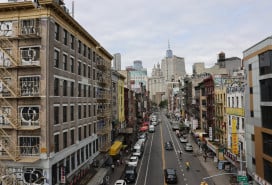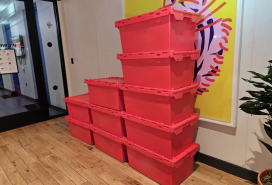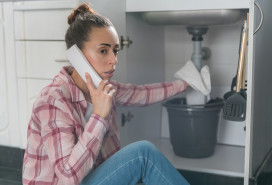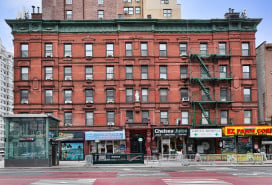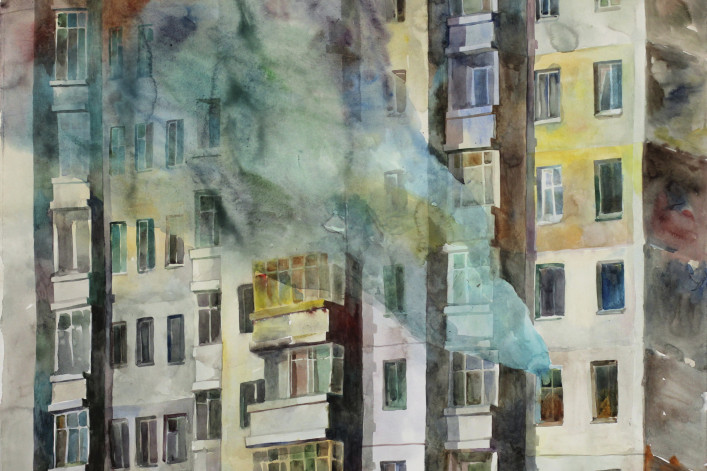
My family and I were burned out of our apartment last June. Con Edison had turned off the gas in our building due to a leak, and the landlord distributed hot plates to the tenants. The first one I received sparked within the first week, so I traded it in for the second one, which I would use sparingly (read: paranoid!), for quick, light meals or a cup of tea.
One night, two months after the gas was turned off, I cooked a pot of pasta before stepping out with my two sons to a school concert. We'd only been out of the house for a half hour when, before taking our seats in the auditorium, I checked my phone to find a barrage of calls and the text messages—all almost identical—that I had missed:
Where are you? …
Are you ok?
Your apartment is on fire!
My heart busting through my chest, I called my next door neighbor to get the immediate scoop, and as she spoke, I only heard every other word:
“Kitchen... Firemen....Gutted."
“Where’s Pablo,” I shouted in a panic, the air and darkness growing thick around me. My four-year-old Havanese was our building’s ‘big man on campus,’ who charmed even the most reluctant dog lover.
“I don’t know—I can’t see beyond the chaos,” my neighbor replied helplessly, I gathered, looking into the wreckage from her doorway.
“Can you please go check with the firemen?”
“He’s here, I’ve got him! He’s OK – he’s all covered in soot, but he’s okay!” One horrific question resolved, leaving many more unanswered.

The kitchen pre-fire.

The fire started in the kitchen and moved from there.
In the month that followed until we moved into our new apartment, we found ourselves scattered and displaced, but fortunately, well taken care of: A friend down the block immediately opened her home and squeezed us in (couches, airbeds, and Nespresso lattes included); another who took in my younger boy for the better part of the month; and others took in Pablo. Finally, our empty–nester friends offered us their two spare bedrooms for a couple of weeks. We were in the best possible situation under the circumstances.
• INSURANCE. Get it now if you don’t have it already. Even if you’re in a rental, there’s no excuse for not being insured. We purchased our policy early on because as renters without equity, we at least wanted the comfort of security in the event of disaster. And for an easily affordable premium , it’s the best peace of mind you’ll ever buy. Keep your insurance files readily accessible, with a copy in safe hands outside of your home, and your carrier’s contact info and your policy number stored in your phone (and share it with your BFF, just in case). Call your carrier immediately after the fire and make your claim. They will arrange for an adjuster to come to your home as soon as the following day to guide you through the process. It's imperative your policy include coverage for ‘replacement cost’ of lost items. If it doesn’t, you may only be covered for the depreciated values—in other words, that Peshawar carpet you purchased for $3,000 in 2002, and would now cost you $4,000 to replace, may only be valued at $800 today, which would be the settlement amount for that item.
• INVENTORY: Itemize all your property, with values, on a spreadsheet (again, with a hard copy, or file, kept outside your home). It can be unbearably tedious, so you can take it one day/one room at a time. It doesn’t have to be too painfully itemized (instead of listing a spatula, salad tongs, potato masher, etc, just list ‘kitchen tools’). As time goes on—and hopefully, you still haven’t had a fire!—you can always insert your new, significant purchases into the sheet you’ve already created. This way, when it’s time to submit your list of unsalvageable items you need to replace to your adjuster, it won’t hold up the process. (Your adjuster will tell you the details you’ll need to include, and values may change after you compose the list, but you’ll have most of the work done.)

Workers sifting through debris in the living room.
• REIMBURSEMENT: Insurance will cover your loss of property, as well as the salvage and clean-up by an expert company—we were happy with Servpro— but be prepared to pay for items upfront , and remain significantly out-of-pocket until they do. They will likely give you an advance—ask for it!—against the eventual complete reimbursement, but this will only cover the depreciated value (see section called "insurance" above) of items, a value they will determine based on the inventory you’ve submitted. Only when you purchase all the replacement items—they give you six months—and submit all receipts together at once (all referencing the itemized inventory), will they review your case again and then pay you the balance for replacement cost of all property. (Generally, insurance companies try to settle these claims within a few weeks, says Jeff Schneider of Gotham Brokerage—full disclosure: a Brick sponsor—and the process can be sped along if you had the foresight to keep some kind of inventory of the space. "Take 20 or 30 photos and store them online," he advises.)
• DISLOCATION: Try to avoid a hotel, even if your understanding is that insurance covers it. Insurance only covers anything above what you’d ordinarily spend on housing for the month: Let’s say your rent is $4,000, and you’re displaced for a month in a hotel, which could easily run you at least $10,000. You’d be responsible for the first $4000, insurance picking up the balance ($6000 in this scenario). But you’re paying your usual ‘rent’ at the hotel, only without most of your personal effects and the usual, miscellaneous comforts and conveniences of home. My sons and I took a two-room suite for two nights, and while it felt like a break for our hosts and ourselves, I realized that even with the privacy of a hotel room, we still felt just as squeezed, disoriented, and inconvenienced as we did staying with friends. Look, it’s not easy to have—or be—a guest, but if it can work out for everyone, better to minimize the outlay while you're out of your home. (Some landlords might even cover your relocation, though it varies from situation to situation, says Aida Gashi of Landlords NY. For instance: After a recent fire, one landlord with the company relocated the tenant below a fire whose place had been soaked during the fire fighting, but declined to find new digs for the tenant who had caused the blaze.)
• BEHIND CLOSED DOORS: My computer (containing my work and photos) was in my bedroom, the door was closed. How do I know? It’s not something I remember doing before I left home, only mine was the only room not covered in soot—the walls were still white (the rest of the apartment was black—and the dust was minimal. Once I moved the computer into my new home, plugged it in and started it up, I saw the next most important thing after my family was safe. Unfortunately, all electronics in the open family room were declared unsalvageable by Servpro, the clean-up experts. (“They may work now," they cautioned, "but this soot is insidious and if your components break down a year from now, it’ll be too late to replace them.")
• FOCUS: I’ve endured plenty of personal disaster. But this last fiasco has enlightened me with this philosophy: Don’t look at the accident on the side of the road, just keep driving to your destination. You’ll have your work cut out for you: You will be on the phone constantly, texting, making appointments, meeting the adjuster and the clean-up experts—Servpro and specialist dry cleaners did an amazing job—plus the fire marshals, the fire inspectors, the forensics people, your landlord. Just take a deep breath and plow through. This is the only way it will get done.
Fortunately for us, there are some silver linings here: First, nothing can compare to the outpouring of warmth, generosity and love that all the friends and neighbors in our building showed us during this fiasco, despite the significant flooding damage from the burst pipes that many suffered in the process. Our building is what "small town living" in the city is all about.
Second, we're now in a smaller, but oddly, nicer apartment in the building just next door. The light is better, the layout is cozier, it has a great vibe, and, yes, it’s cheaper! We’ve just about finished replacing everything, almost all of it from scratch, and dare I say, it looks fabulous. But the best part here is the significant reduction of rent, which makes our smaller space all the more acceptable. We have what we need, and after 20 years of material accumulation, simplifying is a refreshing way to go.
Before the fire, I would often fantasize about getting rid of all my ‘stuff’ and starting fresh—I’m sure we all have done this along the way. With this fire, we had to do just that. And this: As enjoyable as it was to design our new home, I’m choking on the consumerism and constant shipping. If I don't see another serving bowl, sofa, carpet, decorative pillow, or new set of dishes again, it'll be way too soon. And yet, although it really is just ‘stuff’, having it all back allows us to get on with the business of living our lives and being together—under our own fireproof roof.
Diana Geffner-Ventura is a writer and a broker with Halstead Property. She has been published on her kitchen dry-erase board, and most recently in Culture Catch, Prime Number Magazine and Purple Clover.
Related:
Avoid coming home to a crisis: 9 tips for keeping your home safe while you're away
The 5 least safe places to live in your building
8 questions you MUST ask to find the best renters insurance [sponsored]






